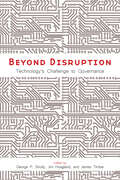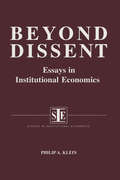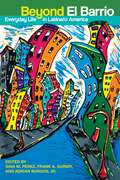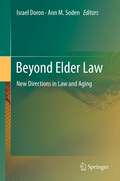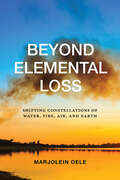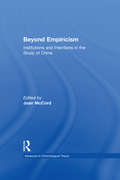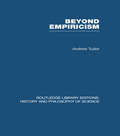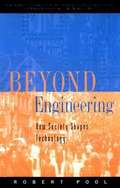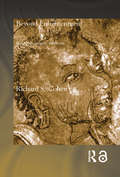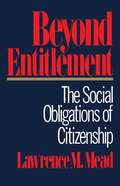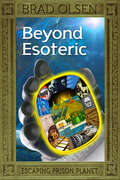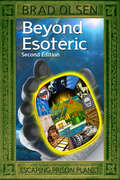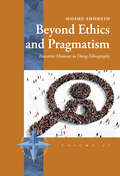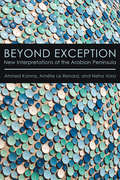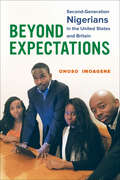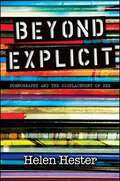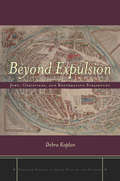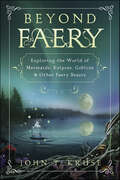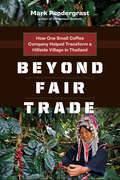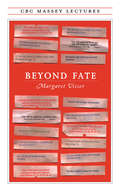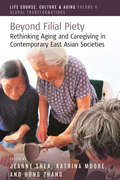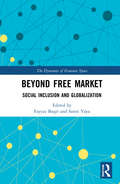- Table View
- List View
Beyond Disruption: Technology's Challenge to Governance
by George P. Shultz Jim Hoagland James TimbieIn Beyond Disruption: Technology's Challenge to Governance, George P. Shultz, Jim Hoagland, and James Timbie present views from some of the country's top experts in the sciences, humanities, and military that scrutinize the rise of post-millennium technologies in today's global society. They contemplate both the benefits and peril carried by the unprecedented speed of these innovations—from genetic editing, which enables us new ways to control infectious diseases, to social media, whose ubiquitous global connections threaten the function of democracies across the world. Some techniques, like the advent of machine learning, have enabled engineers to create systems that will make us more productive. For example, self-driving vehicles promise to make trucking safer, faster, and cheaper. However, using big data and artificial intelligence to automate complex tasks also ends up threatening to disrupt both routine professions like taxi driving and cognitive work by accountants, radiologists, lawyers, and even computer programmers themselves.
Beyond Dissent: Essays in Institutional Economics
by Philip A. KleinThis text provides an ethnography of a Chinese middle school based on fieldwork conducted in 1988 to 1989. It provides a way of looking at classroom and societal interactions in terms of the interplay among criticism, face and shame.
Beyond El Barrio: Everyday Life in Latina/o America
by Gina M. Pérez Frank A. Guridy Adrian Burgos Jr.Freighted with meaning, “el barrio” is both place and metaphor for Latino populations in the United States. Though it has symbolized both marginalization and robust and empowered communities, the construct of el barrio has often reproduced static understandings of Latino life; they fail to account for recent demographic shifts in urban centers such as New York, Chicago, Miami, and Los Angeles, and in areas outside of these historic communities.Beyond El Barrio features new scholarship that critically interrogates how Latinos are portrayed in media, public policy and popular culture, as well as the material conditions in which different Latina/o groups build meaningful communities both within and across national affiliations. Drawing from history, media studies, cultural studies, and anthropology, the contributors illustrate how despite the hypervisibility of Latinos and Latin American immigrants in recent political debates and popular culture, the daily lives of America’s new “majority minority” remain largely invisible and mischaracterized.Taken together, these essays provide analyses that not only defy stubborn stereotypes, but also present novel narratives of Latina/o communities that do not fit within recognizable categories. In this way, this book helps us to move “beyond el barrio”: beyond stereotype and stigmatizing tropes, as well as nostalgic and uncritical portraits of complex and heterogeneous range of Latina/o lives.
Beyond Elder Law: New Directions in Law and Aging
by Ann M. Soden Israel DoronAll over the world, there is a growing interest in the relationship between law and aging: How does the law influence the lives of older people? Can rights, advocacy and representation advance the social position of the aged and combat ageism? What are the new and cutting-edge frontiers in the field of elder law? Should there be a new international human rights convention in this field? These are only a few of the many questions that arise. This book attempts to answer some of these questions and to set the agenda for the future development of elder law across the globe. Taking into account existing research and knowledge, leading scholars from different continents (North America, Europe, Asia, and Australia) present in this book original and novel ideas regarding the future development of elder law. These ideas touch upon key topics such as elder guardianship, citizenship, mental capacity, elder abuse, human rights and international law, family relationships, age discrimination, and the right to die. This book can thus serve as an important reference work for all those interested in understanding where law and aging are headed, and for those concerned about the future legal rights of older persons.
Beyond Elemental Loss: Shifting Constellations of Water, Fire, Air, and Earth (SUNY series in Environmental Philosophy and Ethics)
by null Marjolein OeleOffers an important and innovative contribution to environmental philosophy by investigating loss in times of anthropogenic climate change through the elements of water, fire, air, and earth.Beyond Elemental Loss offers an important and innovative contribution to environmental philosophy by investigating loss in times of anthropogenic climate change through the elements of water, fire, air, and earth. Marjolein Oele argues that the current experience of loss prompts a reassessment of the conventional meaning and conceptualization of loss. She proposes that such loss is best understood through infinitesimal, diachronic shifts occurring in the elemental constellations that structure the world-water, fire, air, and earth-and humanity's incremental inability to cognitively and affectively make sense of this world increasingly transformed by anthropogenic forces. Through a generous yet critical reading of a broad range of interdisciplinary sources tracing changes in our relationship to the elemental over time, Oele's scholarship plumbs the history of philosophy as much as it pulls from Indigenous philosophies, continental thought, mythologies, anthropological and historical sources, science, and ecology. The book's argumentative arc ultimately directs our attention toward constructive transformations in our cognitive and affective habits, and it argues that trust can bring us beyond elemental loss.
Beyond Empiricism: Institutions and Intentions in the Study of Crime (Advances in Criminological Theory #13)
by Joan McCordBeyond Empiricism expands the discourse on theories of criminal behavior. It considers institutional, social, and individual issues related to criminal behavior, while individually each raises questions about the adequacy of current theoretical claims. The topics have significant implications both for policy and research in criminology.Per-Olof Wikstrom introduces a cross-level action theory of crime. He suggests that better understanding of causal mechanisms can lead to a situational theory of action based on perception of alternatives and the process of choice. David Wolcott and Steven Schlossman provide new perspectives on the issues of racial disparity and the incarceration of adolescents in adult prisons. These authors highlight gaps in our understanding of early twentieth-century juvenile justice and negate some popular claims about recent changes in the criminal law. Peter Grabosky spotlights privatization policies in the criminal justice system, suggesting a framework for analyzing the balance of advantage resulting from three basic forms of institutional relationships in policing. Steven Messner and Richard Rosenfeld discuss why institutional analysis has been seriously underdeveloped in etiological analyses of crime. Jordan Pederson and Matthew Shane scrutinize the concept of aggression. Their descriptions of aggressive behavior among non-human animals provide a fascinating backdrop for understanding human actions. Joan McCord emphasizes the intentionality of crimes as she argues that to understand what causes crime, one must have a theory about what it means to act intentionally. After critically appraising prior theories, McCord introduces and defends a new theory of motivation based on a post-empiricist theory of language.This latest volume in the distinguished Advances in Criminological Theory series continues to add to the theoretical underpinnings of the field, and will be important to all collections of social science research on criminology.
Beyond Empiricism: Philosophy of Science in Sociology (Routledge Library Editions: History & Philosophy of Science)
by Andrew TudorOriginally published in 1982. This volume explores some features of modern philosophy of science from the point of view of their utility for sociology’s self-understanding. Recently philosophers of science have broken with the empiricism once fundamental to their discipline, and have sought alternative methods of science. Founded on the belief that these developments are significant for sociologists, the book explores the failings of the old "received view" and some of the more recent alternatives. It proposes a schematic outline of the structure of inquiry, paying detailed attention to questions about the nature of theory, explanation and demonstration.
Beyond Engineering: How Society Shapes Technology (Sloan Technology Series)
by Robert PoolWe have long recognized technology as a driving force behind much historical and cultural change. Now, in Beyond Engineering, science writer Robert Pool turns the question around to examine how society shapes technology. Drawing on such disparate fields as history, economics, risk analysis, management science, sociology, and psychology, Pool illuminates the complex, often fascinating interplay between machines and society, in a book that will revolutionize how we think about technology. We tend to think that reason guides technological development, that engineering expertise alone determines the final form an invention takes. But if you look closely enough at the history of any invention, says Pool, you will find that factors unrelated to engineering seem to have an almost equal impact. In his wide-ranging volume, he traces developments in nuclear energy, automobiles, light bulbs, commercial electricity, and personal computers, to reveal that the ultimate shape of a technology often has as much to do with happenstance, business acumen, and cultural context. Whether discussing bovine growth hormone, nuclear power plants, or baboon-to-human transplants, Beyond Engineering is an engaging look at modern technology and an illuminating account of how technology and the modern world shape each other.
Beyond Enlightenment: Buddhism, Religion, Modernity (Routledge Critical Studies in Buddhism)
by Richard CohenThe vast majority of books on Buddhism describe the Buddha using the word enlightened, rather than awakened. This bias has resulted in Buddhism becoming generally perceived as the eponymous religion of enlightenment. Beyond Enlightenment is a sophisticated study of some of the underlying assumptions involved in the study of Buddhism (especially, but not exclusively, in the West). It investigates the tendency of most scholars to ground their study of Buddhism in these particular assumptions about the Buddha’s enlightenment and a particular understanding of religion, which is traced back through Western orientalists to the Enlightenment and the Protestant Reformation. Placing a distinct emphasis on Indian Buddhism, Richard Cohen adeptly creates a work that will appeal to those with an interest in Buddhism and India and also scholars of religion and history.
Beyond Entitlement: The Social Obligations of Citizenship
by Lawrence M. MeadMead's timely and closely reasoned analysis makes a strong intellectual and moral case for a more authoritative welfare policy.
Beyond Esoteric: Escaping Prison Planet (The Esoteric Series #3)
by Brad OlsenNothing in this world works the way you think it does; there is always more to the story. Be aware that there is a war for your mind and your soul. Corporations have taken over governments in a new form of Fascism that now incorporates high technology and artificial intelligence. The survival of the human race may depend on breaking the Embargo of truth, and collectively developing an ÜberMind. But truth always resonates! Beyond Esoteric takes off the kids gloves, and exposes the control grid extending its tentacles across the planet. The word occult means nothing more than to study the realm of the hidden. So much of real knowledge and wisdom is disguised because the people who run the planet feel that true information of how the world works and how to manifest reality is something you do not need to know. Everything we think we know about the world and the universe in which we live, whatever we have been led to believe concerning the course of human history, could very well be completely wrong, distorted and misinformed. The 19th century teachers of the occult could never have imagined The Ultimate Journey of the 21st century we now face, one that extends far Beyond Esoteric.
Beyond Esoteric: Escaping Prison Planet (The Esoteric Series #3)
by Brad OlsenThe word occult means nothing more than to study the realm of the hidden. So much of real knowledge and wisdom is disguised because the people who run the planet feel that true information as to how the world works is something the "sheeple" should not be informed about. But truth always resonates! Beyond Esoteric takes off the kid gloves and exposes the nefarious control grid extending its tentacles across the planet.
Beyond Ethics and Pragmatism: Evocative Moments in Doing Ethnography (New Directions in Anthropology #47)
by Moshe ShokeidBased on several long-term fieldwork projects in Israel and the Unted States, this book brings together a repertoire of subjective and professional experiences of an anthropologist who attended various theoretical and methodological tutoring settings. That varied panorama of research milieus, ethnographic field sites, and diverse personal engagements, has offered a wide perspective on the complex craft of anthropology. Moreover, it sometimes placed the author in unexpected situations that challenged some habitually accepted modes of personal conduct as well as ethnographic research norms and paradigms, expanding the arena and terms of the anthropological assignments and the record of ethnographic works.
Beyond Exception: New Interpretations of the Arabian Peninsula
by Ahmed Kanna Amélie Le Renard Neha VoraOver the nearly two decades that they have each been conducting fieldwork in the Arabian Peninsula, Ahmed Kanna, Amélie Le Renard, and Neha Vora have regularly encountered exoticizing and exceptionalist discourses about the region and its people, political systems, and prevalent cultural practices. These persistent encounters became the springboard for this book, a reflection on conducting fieldwork within a "field" that is marked by such representations. The three focus on deconstructing the exceptionalist representations that circulate about the Arabian Peninsula. They analyze what exceptionalism does, how it is used by various people, and how it helps shape power relations in the societies they study. They propose ways that this analysis of exceptionalism provides tools for rethinking the concepts that have become commonplace, structuring narratives and analytical frameworks within fieldwork in and on the Arabian Peninsula. They ask: What would not only Middle East studies, but studies of postcolonial societies and global capitalism in other parts of the world look like if the Arabian Peninsula was central rather than peripheral or exceptional to ongoing sociohistorical processes and representational practices? The authors explore how the exceptionalizing discourses that permeate Arabian Peninsula studies spring from colonialist discourses still operative in anthropology and sociology more generally, and suggest that de-exceptionalizing the region within their disciplines can offer opportunities for decolonized knowledge production.
Beyond Expectation: Lesbian/Bi/Queer Women and Assisted Conception
by Jacquelyne LuceAn in-depth study of lesbian, bi, and queer women's experiences of thinking about and trying to become a parent, Beyond Expectation draws on eighty-two narrative interviews conducted during the late 1990s in British Columbia. Jacquelyne Luce chronicles these women's experiences, which took place from 1980 to 2000, during a period that saw significant changes to the governance of assisted reproduction and the status of lesbian, gay, bisexual, and transgender parents and same-sex partners.Beyond Expectation looks closely at the changing contexts in which women's experiences occurred and draws attention to complex issues such as 'contracting' relationships, mediating understandings of biology and genetics, and decision-making amidst various social, legal, and medical developments. Luce skillfully juxtaposes the stories of her interviewees with the wider public discourses about lesbian/bi/queer parenting and reproductive technology and highlights gaps in existing legislative reforms. Most importantly, Beyond Expectation foregrounds the lived experiences of lesbian, bi, and queer women as they negotiate kinship at the intersection of reproduction, technology, and politics.
Beyond Expectations: Second-Generation Nigerians in the United States and Britain
by Onoso ImoageneIn Beyond Expectations, Onoso Imoagene delves into the multifaceted identities of second-generation Nigerian adults in the United States and Britain. She argues that they conceive of an alternative notion of "black" identity that differs radically from African American and Black Caribbean notions of "black" in the United States and Britain. Instead of considering themselves in terms of their country of destination alone, second-generation Nigerians define themselves in complicated ways that balance racial status, a diasporic Nigerian ethnicity, a pan-African identity, and identification with fellow immigrants. Based on over 150 interviews, Beyond Expectations seeks to understand how race, ethnicity, and class shape identity and how globalization, transnationalism, and national context inform sense of self.
Beyond Explicit: Pornography and the Displacement of Sex
by Helen HesterThis original contribution to porn studies aims to interrogate previously untheorized changes in contemporary understandings of the pornographic. Helen Hester argues that the words "porn" and "pornographic" are currently being applied to an ever-expanding range of material and that this change in language usage reflects a wider shift in perception. She suggests that we are witnessing a seemingly paradoxical move away from sex within contemporary understandings of porn, as a range of other factors come to influence the concept. Using examples from media, literature, and culture, and discussing the rise of notions such as "torture porn" and "misery porn," Hester's argument ranges from sexually explicit German novels and British policy documents to a discussion of the differences between European and American editions of pornographic films. She concludes that four factors in particular—transgression, intensity, prurience, and authenticity—can be seen to influence the way that we think about porn.
Beyond Expulsion
by Debra KaplanBeyond Expulsionis a history of Jewish-Christian interactions in early modern Strasbourg, a city from which the Jews had been expelled and banned from residence in the late fourteenth century. This study shows that the Jews who remained in the Alsatian countryside continued to maintain relationships with the city and its residents in the ensuing period. During most of the sixteenth century, Jews entered Strasbourg on a daily basis, where they participated in the city's markets, litigated in its courts, and shared their knowledge of Hebrew and Judaica with Protestant Reformers. By the end of the sixteenth century, Strasbourg became an increasingly orthodox Lutheran city, and city magistrates and religious leaders sought to curtail contact between Jews and Christians. This book unearths the active Jewish participation in early modern society, traces the impact of the Reformation on local Jews, discusses the meaning of tolerance, and describes the shifting boundaries that divided Jewish and Christian communities.
Beyond Faery: Exploring the World of Mermaids, Kelpies, Goblins & Other Faery Beasts
by John T. KruseBehold the Mysteries of the Faery BeastsBeyond the faery realms, all sorts of magical creatures lurk. This book explores the most fearsome beasts that have been known to meddle in human affairs. Renowned faery expert John T. Kruse reveals the secret lives of merfolk, meremaids, river sprites, kelpies, hags, banshees, and many more. These are not the fanciful faeries and kindly beings found in light entertainment. Instead, you will discover hobs, goblins, bogies, and daemon dogs—magical creatures that are more apt to terrify than to help. Beyond Faery shares the features, habits, and history of dozens of these otherworldly beasts, since learning their ways may be just what you need to survive an encounter of your own.
Beyond Fair Trade: How One Small Coffee Company Helped Transform a Hillside Village in Thailand
by Mark PendergrastThe author of Uncommon Grounds offers &“a rich and resonantly detailed account of an unlikely partnership&” that redefined the concept of fair trade (Coffee Review). The Akha hill Tribe of Thailand has a long, tumultuous history. Politics, economics, and land development consistently worked against the Akha&’s desire to move away from their dependency on opium production and create a stable future for their children. That all changed in 2006 when Canadian businessman John Darch met with Thai entrepreneur Wicha Promyong. Their meeting resulted in the establishment of an equal partnership business venture that goes beyond fair trade: the Doi Chaang Coffee Company. Beyond Fair Trade tells the story of the growth of this unique partnership, its successes and challenges, and the incredible people who made it happen.
Beyond Fate (The CBC Massey Lectures)
by Margaret VisserIn spite of modern ideals and achievements in the area of freedom and choice, people today are often afflicted with a sense that they cannot change things for the better. They feel helpless, constrained, caught -- in a word, fatalistic. Beyond Fate, Margaret Visser's 2002 CBC Massey Lectures, examines why. This timely and important book investigates what fate means, and where the propensity to believe in it and accept it comes from. Visser takes an ancient metaphor -- ubiquitous, influential, perhaps unavoidable -- where time is "seen" and spoken of as though it were space; she examines how this way of picturing reality can be a useful tool to think with -- or, on the other hand, may lead us into disastrous misunderstandings. There are ways out. But first, by observing how fatalism manifests itself in our daily lives, in everything from table manners and shopping to sport, we understand our profound attachment to fate, so that we can consider its role in our lives and our cultures.
Beyond Filial Piety: Rethinking Aging and Caregiving in Contemporary East Asian Societies (Life Course, Culture and Aging: Global Transformations #6)
by Jeanne Shea, Katrina Moore, and Hong ZhangKnown for a tradition of Confucian filial piety, East Asian societies have some of the oldest and most rapidly aging populations on earth. Today these societies are experiencing unprecedented social challenges to the filial tradition of adult children caring for aging parents at home. Marshalling mixed methods data, this volume explores the complexities of aging and caregiving in contemporary East Asia. Questioning romantic visions of a senior’s paradise, chapters examine emerging cultural meanings of and social responses to population aging, including caregiving both for and by the elderly. Themes include traditional ideals versus contemporary realities, the role of the state, patterns of familial and non-familial care, social stratification, and intersections of caregiving and death. Drawing on ethnographic, demographic, policy, archival, and media data, the authors trace both common patterns and diverging trends across China, Hong Kong, Taiwan, Singapore, Japan, and Korea.
Beyond Fitting In: Rethinking First-Generation Writing and Literacy Education
by Kelly RitterBeyond Fitting In interrogates how the cultural capital and lived experiences of first-generation college students inform literacy studies and the writing-centered classroom. Essays, written by scholar-teachers in the field of rhetoric and composition, discuss best practices for teaching first-generation students in writing classrooms, centers, programs, and other environments. The collection considers how first-gen students of different demographics interact with and affect literacy instruction in a variety of public and private, rural and urban schools offering two- or four-year programs, including Hispanic-serving institutions, historically Black colleges and universities, and public research universities. By exploring the experiences of students, teachers, writing program administrators, and writing center directors, the volume gives readers an inside view of the practices and structures that shape the literacy of first-generation students.
Beyond Free Market: Social Inclusion and Globalization (The Dynamics of Economic Space)
by Fayyaz Baqir Sanni YayaThis book explores the causes and consequences of market failure in bridging societal differences to create a shared economy. It questions the current world order and evaluates socio-economic gains in reference to the social origins of the economic agents. With a need to counterbalance economic growth with social equality and environmental sustainability, the book proposes innovative approaches to address key questions on the contemporary global economy such as, "Is the Global socio-economic order supportive of the pursuit of rational and enlightened self -interest?", "Is it a unipolar power centre and neoliberal economic policy regime?", "Can the system reinvent itself?", etc. One approach encourages going back to the golden past and making things "great again", insisting that history has ended and the failures of old global institutions be blamed on the "Clash of Civilizations". Another approach advocates giving up the intellectual comfort zone of elegant but irrelevant neo-liberal explanations of global challenges and asking new questions that take academic debate to the public square. The book examines the internal challenges and contradictions that cause disintegration and proposes alternative ideas and practices in moving the global community beyond the free market regime. The book will appeal to students and academics of development studies, political economy, political science, sociology, as well as policymakers and public opinion makers interested in creating a new egalitarian global society.
Beyond Freedom's Reach
by Adam RothmanAfter Union forces captured New Orleans in 1862, Rose Herera's owners fled to Havana, taking her three children with them. Adam Rothman tells the story of Herera's quest to rescue her children from bondage after the war. As the kidnapping case made its way through the courts, it revealed the prospects and limits of justice during Reconstruction.
